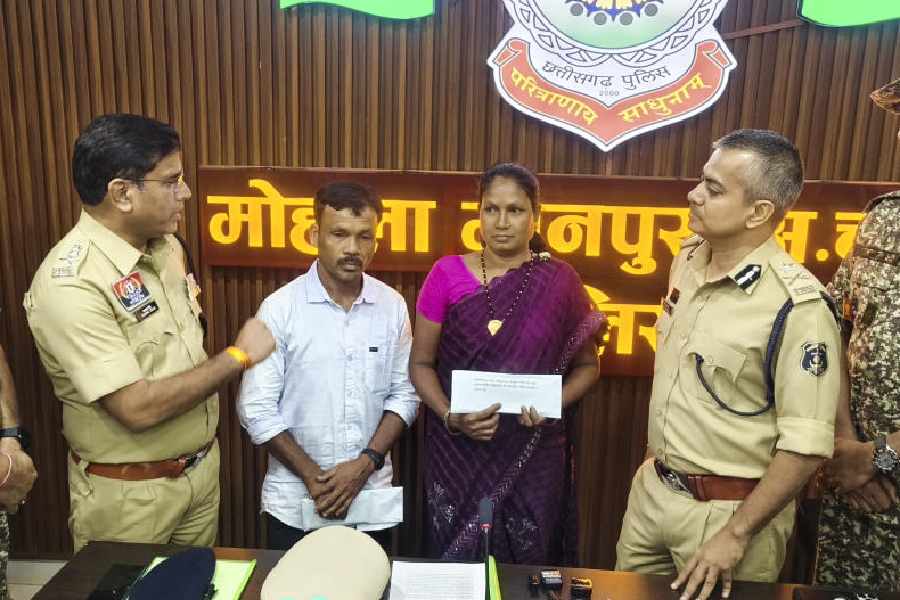Three Maoists, including a member of the central committee of the banned CPI (Maoist), were killed in an encounter inside a forested area of Maredumilli in Andhra Pradesh’s Alluri Sitharama Raju district in the small hours of Wednesday.
Sources said the slain central committee member was identified as Gajarla Ravi alias Uday. Venkata Chaitanya alias Aruna, a senior Maoist leader of the Andhra-Odisha border special zonal committee and another unidentified rebel were also killed during the combing operation conducted by the elite anti-Naxalite Greyhound unit of Andhra Pradesh police.
Aruna was the wife of central committee member Chalapathi, who was killed earlier this year in an encounter with the security forces at Gariaband in Chhattisgarh bordering Odisha.
“Both Uday and Aruna headed the Maoist operations in Andhra-Odisha borders and were on the most wanted list of the National Investigation Agency (NIA). Uday is the fifth central committee member who has been gunned down by the security forces this year amid the ongoing counter-offensive against rebels across the country,” said a security official attached to the Union home ministry.
Last month, Nambala Keshavrao alias Basavaraju, the country’s topmost Maoist leader, was among 27 insurgents gunned down inside the Abhujmad forest
in Chhattisgarh.
Sources said Uday, considered the seniormost Maoist leader in the Andhra Pradesh-Odisha border areas, belonged to the Karimnagar district of Telangana. He had a strong hold over the densely forested region and was earlier accused of hatching an assassination plot against Andhra Pradesh chief minister N. Chandrababu Naidu in 2003.
The encounter took place at Kondamodalu village in Maredumilli, which borders Odisha’s Malkangiri and Koraput districts.
“Acting on intelligence about Maoist presence in the area, security forces launched the operation, which led to a fierce exchange of fire with Maoists. An AK-47 and other weapons were recovered from the encounter site,” said
the official.
According to him, combing operations are continuing in the Maredumilli forests and some Maoist leaders are believed to have fled the scene.
Uday had joined the Maoist movement in 1992 at the age of 23 and rose through the ranks to become a member of the central committee. In 2004, he participated in peace talks with the government as a representative of the then People’s War Group.
He is said to have led several operations against the security forces, including the killing of four BSF jawans in Odisha’s Malkangiri district in 2012 and the Balimela reservoir attack that killed 38 Greyhounds in 2008.
Security has been tightened in Andhra Pradesh and Telangana after the CPI (Maoist) called for a bandh on June 20 to protest the ongoing anti-insurgency operations in Chhattisgarh.
In the wake of the onslaught by security forces, the rebels had issued a statement in April seeking a “ceasefire” with preconditions. The statement said the rebels were ready for peace talks on the condition that the government halt its anti- Maoist operations in the region and stop the establishment of new camps of armed forces in various states, including Chhattisgarh.
The media statement also flagged concerns over human rights abuses, citing “illegal detentions and torture of civilians”.
The statement had demanded that the Centre commit to an immediate withdrawal of security forces from tribal-dominated areas, halt further deployment of troops in Maoist-hit regions, and a complete cessation of counter-insurgency drives such as Operation Kagar to create a conducive environment for peace discussions.
The Chhattisgarh government had said it wanted a peaceful resolution to end violence but rejected any preconditions, adding the government had already implemented a new rehabilitation policy for Maoists, and urged them to surrender and benefit from it.
Mobile tower
A mobile tower has been installed at a remote village in Chhattisgarh’s Bijapur district where Maoists blew up a vehicle using an IED, killing eight security men and their civilian driver in January. The tower will facilitate Internet and other telecom services for residents.










